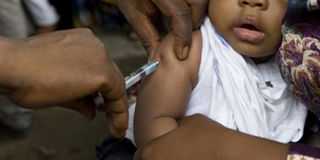Let's play our part during African vaccination week

What you need to know:
- The week is themed “Vaccines Work. Do Your Part”, and this year’s slogan is “Vaccinated Communities, Healthy Communities”.
Parents would usually do their best to ensure that their children stay healthy. One way of doing that is by vaccinating them against common diseases. It so happens that the African Vaccination Week (AVW) is upon us.
The week is themed “Vaccines Work. Do Your Part”, and this year’s slogan is “Vaccinated Communities, Healthy Communities”.
According to the World Health Organisation (WHO), the theme highlights the collective action needed to ensure that people are protected from vaccine-preventable diseases. It urges enhanced immunisation across Africa, with particular focus on the roles that all and sundry can play in this. After AVW was launched in April 2011, many African countries have conducted health-related campaigns promoting immunisation and other child survival interventions. The results have been most encouraging.
According to WHO data, nearly 14 million vaccine doses were administered in 19 African countries in 2017, and about 10 million deworming tablets were distributed in Angola, Central African Republic (CAR), Comoros, Madagascar and Rwanda.
Also, some 6.3 million vitamin A tablets were distributed in Angola, CAR, Comoros, Madagascar, Rwanda, Sao Tomé, and Zimbabwe, while 7.7 million children were screened for malnutrition in Angola, Madagascar and Rwanda. Furthermore, there were malaria and HIV testing activities in Angola and Madagascar, as well as distribution of family planning devices in Rwanda.
African Vaccination Week is marked during the last week of April – along with World Immunisation Week – to strengthen immunisation programmes and increase awareness of the importance, the need and the right of everyone to be protected from vaccine-preventable diseases. That is why Tanzania must within the comity of nations keep immunisation high on the agenda to promote delivery of big-impact lifesaving interventions.
We should also go out of our way to educate parents on the importance of timely vaccination, if only because vaccine-preventable diseases can be costly in terms of medical expenses, loss of productive labour/time and even death.




